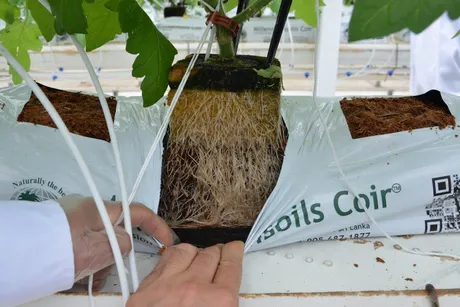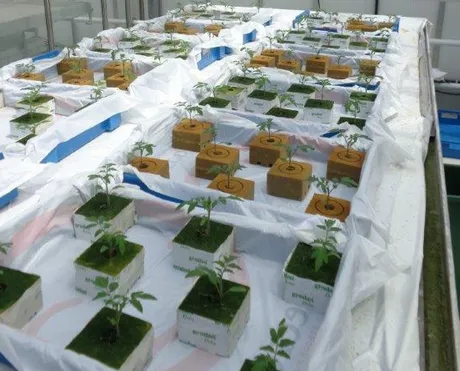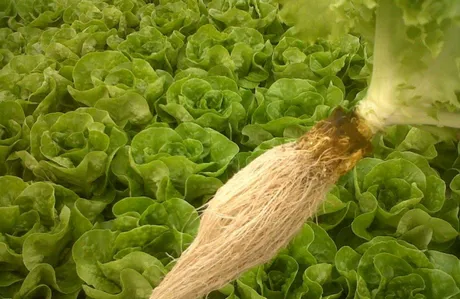For the past few years, Mexican vegetable growers have been very successfully adapting Peatfoam as a propagation medium. The propagation blocks are primarily used in a cultivation cycle with cocopeat slabs. Many growers and agronomists were so enthusiastic about the achievements of the Peatfoam that it has become their substrate of choice.
Peatfoam is developed and produced by Tecnofen, a Mexican company that was established in 2000 with it's primary product Floricel floral foam.

Peatfoam used in the propagation greenhouse of a large Mexican tomato grower.
"Floral foam is still an important market, yet Peatfoam has become our fastest growing business," says Jeffrey Broersma, Export Manager at Tecnofen. "With our Peatfoam we focus on high tech greenhouses. This is a very big market which is very interesting to us because we now have the possibility to enter a year round process, while the production of floral foam depends more on the season."
Tecnofen employs agricultural experts that help growers implement Peatfoam in their production sites. Peatfoam is customized in size and density according to the needs of the grower. "We don't use additional synthetic colour in the Peatfoam. Peatfoam has a low Ec-level and the pH level in the Peatfoam is close to neutral." Peatfoam delivers more generative plants with very low losses.

Picture taken at another Mexican tomato grower. You can see how perfect the roots are transmitted from the peatfoam towards the coir substrate slabs. At this point, the Peatfoam block did his job and from this point it dehydrates and maintain a function as protector of the crop's stem. Peatfoam is not a compressed substrate and doesn't consist of merged fibres. This allows the roots to develop in all directions, as they will find no resistance. In stonewool roots grow only vertically, in the direction of the compressed fibres.
At this moment, the propagation cubes are very popular in the Mexican greenhouses. "Many vegetable growers are using them as an alternative to rockwool. Not only because of the price aspect; Peatfoam is also a substrate with a lower environmental impact, as it's completely mechanically-degradable. During the crop change you can just plow it into the ground as its water absorbing and retaining characteristics help to improve the soil-quality", Broersma claims.

The Dutch research lab Groen Agro Control did extensive trials with Peatfoam: on this picture the difference can be seen in Algae on both substrates. Peafom stays clean and is less suspicious to algae; this should result in less disease pressure as well as stronger plants because the small young plant has less competition from a parasite crop.
Peatfoam propagation cubes come in all sorts of size configurations that can easily be compared to the configurations of rockwool. This makes the media a very interesting good alternative for rockwool propagation cubes as many commercial propagators already have their operations standardized to rockwool cubes. Peatfoam can be handled the same way, as it is a firm substrate and from a distance you will hardly see the difference with a rockwool appearance.

Peatfoam results in strong generative growth with healthy roots.
As well as this, Peatfoam is also available as a propagation plug, and even comes in slabs. "We are now manufacturing a slab for commercial vegetable cultivation, trials have proven to be successful," said Broersma.
In Mexico and other countries, stonewool is an expensive substrate, because it needs to be imported. With Peatfoam you can get the same or even better crop results for a lower price. Another advantage is that the Peatfoam is sterile and, unlike stonewool, it's mechanically degradable which means that there won't remain any waste. Another advantage of Peatfoam is the cellular structure: once you've squeezed the foam, it won't get back in its original shape. This is an advantage, because the roots won't get any elastic resistance.
Tecnofen, the Mexican manufacturer behind Peatfoam is so convinced of the success of the product that it has big plans to expand its market with distributors in Latin America, the United states and Europe. "Just like last year we will once again exhibit at the Expo Agro Alimentaria in Irapuato, Mexico. At our booth we will show that Peatfoam is perfect for cultivating all kinds of crops. We invite everybody to come and see!," Broersma concluded.
For more information
Tecnofen S.A. de C.V.
Jeffrey Broersma
Export Manager
T: +52 722 199 20 73
[email protected]
www.peatfoam.com
www.floricel.com.mx
